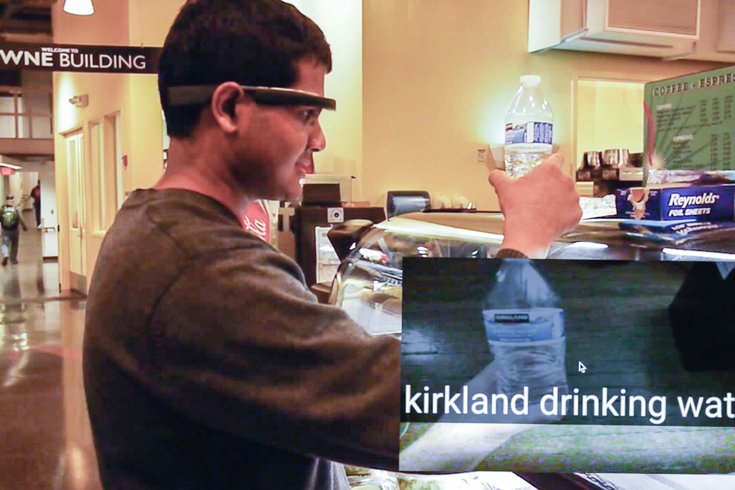
February 15, 2017
 Photo Illustration by ThirdEye/for PhillyVoice
Photo Illustration by ThirdEye/for PhillyVoice
Rajat Bhageria scans a water bottle using ThirdEye's Google Glass prototype. Cofounders of the nonprofit include Ben Sandler and Joe Cappadona.
Four students at the University of Pennsylvania have successfully sold a company that originally formed out of a 36-hour PennApps hackathon back in 2014. Now the former CEO wants to help college students realize that it isn't as tough as they may think to launch a business while enrolled in school.
On Tuesday, TechCrunch announced that ThirdEye, a mobile object recognition app for the visually impaired, has been acquired by TheBlindGuide, a multifaceted ecommerce provider of resources for the blind and those with limited vision. Financial terms of the deal were not disclosed.
It's a big moment for Rajat Bhageria, Ben Sandler, Daniel Hanover and Nandeet Mehta, who originally developed their technology as an add-on for the obsolete Google Glass. The video below demonstrates how the original concept worked. In a nutshell, those with visual impairments can now use the mobile app to identify nearby objects, products and text — a useful tool if you're out grocery shopping or you need to read a posted notice.
In 2015, ThirdEye was named the "Most Disruptive" company in the Wharton School's annual Business Plan Competition. Bhageria was just a freshman at the time and ThirdEye had the incredibly challenging task of learning how to solve a problem they couldn't personally understand and experience.
"What's really interesting is empathizing with this group," Bhageria, now a junior, told PhillyVoice. "We spent two years with the visually impaired community, but it's very difficult to truly empathize. Our pitch was always to ask people to close their eyes and imagine what it would be like if that's how they were all the time. I still can't imagine what life would be like without sight."
Over the past few years, ThirdEye presented at the Consumer Electronics Show (CES) and the National Wearables Conference. They worked with the National Federation for the Blind and other local organizations for the visually impaired. They created a legitimate tech-based solution to some of the daily struggles confronted by those with limited or no eyesight.
But as Bhageria explained in a column for Forbes, it was time to give ThirdEye a chance to flourish under the leadership of a company steeped in the visually impaired community.
While we became very successful at building products and launching them with very few resources, since we were students we had limited time and also limited experience with the regulatory healthcare space. When a few parties approached us about taking over ThirdEye, we thought hard and decided that it would be for the best.
Much of ThirdEye's work, Bhageria explained, was about learning how to get things done at a fraction of the typical cost by leveraging student status. The group never made a secret of the fact that they were bootstrapped. It didn't stop them from developing a useful product that inspired investors and filled an urgent need.
"We really didn't have any resources and we were able to do something cool," Bhageria said. "I want more of my peers to understand that they don't necessarily have to take investment banking to get something started. A lot of people think it's very risky to start a business when you're in college, but it really isn't. We've all heard about Facebook, and how you can leave school and come back, but our story shows you don't even have to drop out."
The next step for Bhageria will be launching his own venture fund, Prototype Capital, for college students around the country and eventually the world. His aim is to take on current market leaders Dorm Room Fund and Rough Draft Ventures with a decentralized seed-financing circuit.
"Right now we have ten universities on the network—Penn, Cornell and several west coast universities like UCLA, Stanford and Berkely," Bhageria said. "I would argue that Dorm Room Fund and Rough Draft don't add much value to the student founders. By virtue of the fact that they're partners, they haven't worked at a company. We have and we understand the ins and outs of getting access as a student, whether it's funding or free legal help."
Bhageria believes not enough attention and too few resources are being directed to student founders outside the realm of the most prestigious universities. He points to companies such as Dell and Reddit, which came from the well-reputed University of Texas at Austin and the University of Virginia, respectively, as examples of innovation that his competitors could miss without establishing a broader network of participating colleges.
"They are missing out on state schools," Bhageria said. "It ultimately hurts the world because investors and founders are both missing out."
ThirdEye won't likely be the last we hear of Bhageria as a product developer, either. But next time, he said he'll have a different approach in mind.
"The next time I do something, I want to build a product for myself."